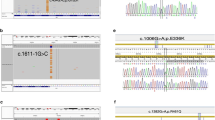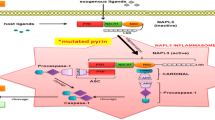Abstract
An 86-year-old Caucasian man had prior episodes of fever (up to 38 °C), mild abdominal pain, tachycardia, and malaise in the last 3 months, lasting 2–3 days. He never suffered from abdominal or chest pain, rash, or arthralgia. Major causes of fever were excluded (pulmonary, urinary, abdomen, skin infections, neoplasms, and major rheumatologic disorders). The patient was native of Altamura with a family history of familial Mediterranean fever (FMF). The genetic testing confirmed the presence of MEFV gene variants c.442G>C (E148Q) on exon 2 and c.2282G>A (R761H) on exon 10, all in heterozygosity. Mildly elevated serum transaminases suggested an ongoing form of FMF hepatitis on nonalcoholic liver steatosis. The patient started colchicine 1 mg/day that induced symptom control and normalization of inflammatory markers, hyperbilirubinemia, and markers of cholestasis. Symptoms of FMF can appear at any age in life and our patient represents a very late-onset clinical case. The Apulian region has a consistent clustering of MEFV variants and FMF families with affected individuals in multiple consecutive generations. Families show unique clinical features and rare signs of secondary amyloidosis without kidney damage. Genetic and environmental bases of this phenotypic variant are under scrutiny. Colchicine lifetime remains the mainstay of treatment in FMF patients.
Key Points
• Familial Mediterranean fever (FMF) is the most frequent hereditary monogenic recurrent fever syndrome, and symptoms can appear at any age in life.
• Late-onset FMF approaches 30% in late adulthood, but in general, onset of FMF after the age of 40 (late onset FMF) is rare, usually associated with M694V heterozygosity.
• In a local cluster of FMF families (Altamura, Puglia, Southern Italy), we report a very late-onset FMF (variants E148Q, R761H) in an 86-year-old patient with a positive family history of FMF in two generations of descendants.
• While lifetime colchicine remains the mainstay of treatment in FMF patients, prospective studies need to identify the characteristics of several phenotypic variants accounting for (very)-late onset FMF.

Similar content being viewed by others
References
Bonfrate L, Scaccianoce G, Palasciano G, Ben-Chetrit E, Portincasa P (2017) A novel cluster of patients with familial Mediterranean fever (FMF) in southern Italy. Eur J Clin Investig 47:622–629
Ben-Chetrit E, Touitou I (2009) Familial Mediterranean fever in the world. Arthritis Rheum 61:1447–1453
Ozen S, Demirkaya E, Erer B, Livneh A, Ben-Chetrit E, Giancane G, Ozdogan H, Abu I, Gattorno M, Hawkins PN, Yuce S, Kallinich T, Bilginer Y, Kastner D, Carmona L (2016) EULAR recommendations for the management of familial Mediterranean fever. Ann Rheum Dis 75:644–651
Livneh A, Langevitz P, Zemer D, Zaks N, Kees S, Lidar T, Migdal A, Padeh S, Pras M (1997) Criteria for the diagnosis of familial Mediterranean fever. Arthritis Rheum 40:1879–1885
Portincasa P, Scaccianoce G, Palasciano G (2013) Familial Mediterranean fever: a fascinating model of inherited autoinflammatory disorder. Eur J Clin Investig 43:1314–1327
Moradian MM, Sarkisian T, Ajrapetyan H, Avanesian N (2010) Genotype-phenotype studies in a large cohort of Armenian patients with familial Mediterranean fever suggest clinical disease with heterozygous MEFV mutations. J Hum Genet 55:389–393
The International FMF Consortium (1997) Ancient missense mutations in a new member of the RoRet gene family are likely to cause familial Mediterranean fever. Cell 90:797–807
The French FMF Consortium (1997) A candidate gene for familial Mediterranean fever. Nat Genet 17:25–31
Bernot A, da Silva C, Petit JL, Cruaud C, Caloustian C, Castet V, Ahmed-Arab M, Dross C, Dupont M, Cattan D, Smaoui N, Dodé C, Pêcheux C, Nédelec B, Medaxian J, Rozenbaum M, Rosner I, Delpech M, Grateau G, Demaille J, Weissenbach J, Touitou I (1998) Non-founder mutations in the MEFV gene establish this gene as the cause of familial Mediterranean fever (FMF). Hum Mol Genet 7:1317–1325
Stella A, Cortellessa F, Scaccianoce G, Pivetta B, Settimo E, Portincasa P (2019) Familial Mediterranean fever: breaking all the (genetic) rules. Rheumatology (Oxford) 58:463–467
Shinar Y, Obici L, Aksentijevich I, Bennetts B, Austrup F, Ceccherini I, Costa JM, de Leener A, Gattorno M, Kania U, Kone-Paut I, Lezer S, Livneh A, Moix I, Nishikomori R, Ozen S, Phylactou L, Risom L, Rowczenio D, Sarkisian T, van Gijn ME, Witsch-Baumgartner M, Morris M, Hoffman HM, Touitou I (2012) Guidelines for the genetic diagnosis of hereditary recurrent fevers. Ann Rheum Dis 71:1599–1605
Witsch-Baumgartner M, Touitou I (2015) Clinical utility gene card for: prototypic hereditary recurrent fever syndromes (monogenic autoinflammatory syndromes). Eur J Hum Genet 23:1111
Tsuchiya-Suzuki A, Yazaki M, Nakamura A et al (2009) Clinical and genetic features of familial Mediterranean fever in Japan. J Rheumatol 36:1671–1676
Van Gijn ME, Ceccherini I, Shinar Y et al (2018) New workflow for classification of genetic variants’ pathogenicity applied to hereditary recurrent fevers by the International Study Group for Systemic Autoinflammatory Diseases (INSAID). J Med Genet 55:530–537
Ozturk C, Halicioglu O, Coker I et al (2012) Association of clinical and genetical features in FMF with focus on MEFV strip assay sensitivity in 452 children from western Anatolia, Turkey. Clin Rheumatol 31:493–501
Mattit H, Joma M, Al-Cheikh S et al (2006) Familial Mediterranean fever in the Syrian population: gene mutation frequencies, carrier rates and phenotype-genotype correlation. Eur J Med Genet 49:481–486
Giaglis S, Papadopoulos V, Kambas K, Doumas M, Tsironidou V, Rafail S, Kartalis G, Speletas M, Ritis K (2007) MEFV alterations and population genetics analysis in a large cohort of Greek patients with familial Mediterranean fever. Clin Genet 71:458–467
Cantarini L, Capecchi PL, Lucherini OM, Laghi Pasini F, Galeazzi M (2010) Familial Mediterranean fever diagnosed in an elderly patient. Clin Exp Rheumatol 28:S91
Marek-Yagel D, Berkun Y, Padeh S, Abu A, Reznik-Wolf H, Livneh A, Pras M, Pras E (2009) Clinical disease among patients heterozygous for familial Mediterranean fever. Arthritis & Rheumatism: Official Journal of the American College of Rheumatology 60:1862–1866
Sohar E, Gafni J, Pras M, Heller H (1967) Familial Mediterranean fever. A survey of 470 cases and review of the literature. Am J Med 43:227–253
Sayarlioglu M, Cefle A, Inanc M et al (2005) Characteristics of patients with adult-onset familial Mediterranean fever in Turkey: analysis of 401 cases. Int J Clin Pract 59:202–205
Tamir N, Langevitz P, Zemer D, Pras E, Shinar Y, Padeh S, Zaks N, Pras M, Livneh A (1999) Late-onset familial Mediterranean fever (FMF): a subset with distinct clinical, demographic, and molecular genetic characteristics. Am J Med Genet 87:30–35
Tunca M, Akar S, Onen F, Ozdogan H, Kasapcopur O, Yalcinkaya F, Tutar E, Ozen S, Topaloglu R, Yilmaz E, Arici M, Bakkaloglu A, Besbas N, Akpolat T, Dinc A, Erken E, Turkish FMF Study Group (2005) Familial Mediterranean fever (FMF) in Turkey: results of a nationwide multicenter study. Medicine (Baltimore) 84:1–11
Levy M, Eliakim M (1977) Long-term colchicine prophylaxis in familial Mediterranean fever. Br Med J 2:808
Yamane T, Uchiyama K, Hata D, Nakamura M, Ishii T, Koido S, Fujise K, Tajiri H (2006) A Japanese case of familial Mediterranean fever with onset in the fifties. Intern Med 45:515–517
Erten S (2016) Familial Mediterranean fever patient with onset of attacks at the age of seventies. Journal of Clinical and Analytical Medicine 7:109
Al-Khafaji J, Ganz-Lord F, Konjeti VR, Viny AD (2018) A case of familial Mediterranean fever with extensive lymphadenopathy and complex heterozygous genotype presenting in the fourth decade. Case Rep Rheumatol 2018:9670801
Endo Y, Koga T, Ishida M, Fujita Y, Tsuji S, Takatani A, Shimizu T, Sumiyoshi R, Igawa T, Umeda M, Fukui S, Nishino A, Kawashiri SY, Iwamoto N, Ichinose K, Tamai M, Nakamura H, Origuchi T, Agematsu K, Yachie A, Masumoto J, Migita K, Kawakami A (2018) Musculoskeletal manifestations occur predominantly in patients with later-onset familial Mediterranean fever: data from a multicenter, prospective national cohort study in Japan. Arthritis Res Ther 20:257
Kishida D, Yazaki M, Nakamura A, Tsuchiya-Suzuki A, Shimojima Y, Sekijima Y (2019) Late-onset familial Mediterranean fever in Japan. Mod Rheumatol:1–4
Aydin O, Ugurlu S, Ozdogan H (2019) THU0590 comparison of FMF patients with age of onset before 20 versus 40 years and over. Ann Rheum Dis 78:586
Migita K, Agematsu K, Yazaki M, Nonaka F, Nakamura A, Toma T, Kishida D, Uehara R, Nakamura Y, Jiuchi Y, Masumoto J, Furukawa H, Ida H, Terai C, Nakashima Y, Kawakami A, Nakamura T, Eguchi K, Yasunami M, Yachie A (2014) Familial Mediterranean fever: genotype-phenotype correlations in Japanese patients. Medicine (Baltimore) 93:158–164
Kishida D, Nakamura A, Yazaki M, Tsuchiya-Suzuki A, Matsuda M, Ikeda S (2014) Genotype-phenotype correlation in Japanese patients with familial Mediterranean fever: differences in genotype and clinical features between Japanese and Mediterranean populations. Arthritis Res Ther 16:439
Ben-Chetrit E, Levy M (1998) Familial Mediterranean fever. Lancet 351:659–664
Korkmaz C, Kasifoglu T (2007) Changes in the liver function tests during the attacks of familial Mediterranean fever. Rheumatol Int 27:395–398
Ben-Chetrit E, Yazici H (2017) The liver in familial Mediterranean fever: is it involved? Clin Exp Rheumatol 35:S108–S112
Portincasa P (2016) Colchicine, biologic agents and more for the treatment of familial Mediterranean fever. The old, the new, and the rare. Curr Med Chem 23:60–86
Grattagliano I, Bonfrate L, Ruggiero V, Scaccianoce G, Palasciano G, Portincasa P (2014) Novel therapeutics for the treatment of familial Mediterranean fever: from colchicine to biologics. Clin Pharmacol Ther 95:89–97
Wang D, Bonfrate L, de Bari O, Wang T, Portincasa P (2014) Familial Mediterranean fever: from pathogenesis to treatment. J Genet Syndr Gene Ther 5:2
Federici S, Sormani MP, Ozen S, Lachmann HJ, Amaryan G, Woo P, Koné-Paut I, Dewarrat N, Cantarini L, Insalaco A, Uziel Y, Rigante D, Quartier P, Demirkaya E, Herlin T, Meini A, Fabio G, Kallinich T, Martino S, Butbul AY, Olivieri A, Kuemmerle-Deschner J, Neven B, Simon A, Ozdogan H, Touitou I, Frenkel J, Hofer M, Martini A, Ruperto N, Gattorno M, for the Paediatric Rheumatology International Trials Organisation (PRINTO) and Eurofever Project (2015) Evidence-based provisional clinical classification criteria for autoinflammatory periodic fevers. Ann Rheum Dis 74:799–805
Yenokyan G, Armenian HK (2012) Triggers for attacks in familial Mediterranean fever: application of the case-crossover design. Am J Epidemiol 175:1054–1061
Acknowledgments
We are indebted to Rosanna Bagnulo, Paola De Benedictis, and Rosa De Venuto for skillful technical assistance. We also thank Dr. Paolo Buonamico for clinical management, Prof. Eldad Ben-Chetrit for helpful scientific discussion, and Paolo Calveri, president of Italian Association of Periodic Fevers (AIFP). This work was partly supported from FARB-MIUR grant to AS.
Author information
Authors and Affiliations
Contributions
PR, AS, ES, FP, FM, AB, VOP, SP, and GS contributed to the clinical, instrumental, and biohumoral workup of the patient. PP wrote the first draft and revised the final version. AS was responsible for the genetic analysis. All authors approved the final version of the manuscript.
Corresponding author
Ethics declarations
Disclosures
None.
Ethics approval
Our institutions do not require ethical approval for reporting individual cases or case series.
Informed consent
Written informed consent was obtained from the patient for his anonymized information to be published in this article.
Additional information
Publisher’s note
Springer Nature remains neutral with regard to jurisdictional claims in published maps and institutional affiliations.
Rights and permissions
About this article
Cite this article
Ricci, P., Stella, A., Settimo, E. et al. The grandfather’s fever. Clin Rheumatol 39, 585–594 (2020). https://doi.org/10.1007/s10067-019-04741-9
Received:
Revised:
Accepted:
Published:
Issue Date:
DOI: https://doi.org/10.1007/s10067-019-04741-9




